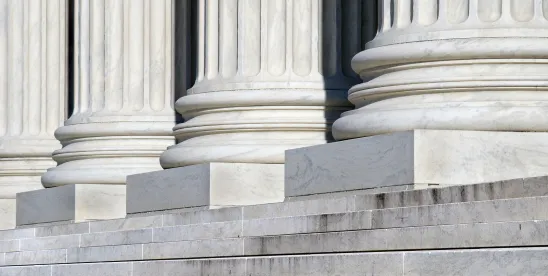Let’s Get You Up To Speed
In McLaughlin Chiropractic Assocs., Inc. v. McKesson Corp., No. 23-1226, 2025 WL 1716136 (U.S. June 20, 2025), the Supreme Court determined that the Hobbs Act does not bind district courts in civil enforcement proceedings to adopt an agency’s interpretation of a statute. Rather, district courts must make their own determinations under ordinary principles of statutory interpretation while affording appropriate respect to the agency’s interpretation. According to the Supreme Court, the phrase “determine the validity” merely bars a district court from striking down the agency order outright– it does not prevent them from applying a different rule of law where the agency’s interpretation is deemed inapplicable.
As a result, the Supreme Court applied a “default rule” which permits district courts to review and depart from agency action when appropriate.
The Dissent
Justice Kagan, joined by Justices Sotomayor and Jackson, dissented.
“Ship first, litigate later… [A]s the majority sees things, the Act ‘does not preclude district courts’ from declaring a rule or order invalid years after it issued, at the behest of a party who declined to seek judicial review in the first instance.”
McLaughlin Chiropractic Assocs., Inc. v. McKesson Corp., No. 23-1226, 2025 WL 1716136, at *13 (U.S. June 20, 2025).
The dissent highlights a simple idea: when Congress has created a framework – like the Hobbs Act – for how and when to challenge agency interpretations, courts should yield to that structure. Under the Hobbs Act, agency orders must be challenged directly and timely in the court of appeals. If nobody does, the interpretation stands.
According to the dissent, the majority fumbled a matter of basic statutory interpretation. “The text of the Hobbs Act makes clear that litigants who have declined to seek pre-enforcement judicial review may not contest the statutory validity of agency action in later district-court enforcement proceedings.” Id. at *14. The dissent views the majority as sidestepping the Hobbs Act’s natural meaning by inventing a brand-new “default rule”—one that says Congress must use specific words or build in redundancy to bar future challenges. In doing so, the majority effectively guts the Hobbs Act and jeopardizes the predictability and effectiveness of administrative enforcement.
The Hobbs Act gives federal courts of appeals the exclusive power to review and invalidate certain agency rules and orders. The core question is whether that exclusivity bars someone from later challenging an agency’s action in a district court enforcement case, long after the action was issued and reviewed. The dissent argues this question is answered by the text of the statute.
“[T]he Hobbs Act gives courts of appeals exclusive authority to ‘determine the validity’ of specified agency actions. ‘Exclusive,’ of course, means courts of appeals alone, not district courts.”
Id. at *14. Thus, if a district court rejects an agency order, the district court is doing what the Hobbs Act expressly forbids: “determin[ing] the validity” of that rule. This undermines the Act’s exclusive-review structure and allows litigants to sidestep Congress’ clear division of judicial power.
The dissent further criticizes the majority’s interpretation of “determine the validity” to mean “issue a declaratory judgment determining the validity.” Nothing in the Hobbs Act limits the term to the majority’s narrow interpretation and Congress is more than capable of saying so if that’s what it intended. The majority has essentially rewritten the statue by adding language Congress didn’t intend to include.
According to the dissent, history, precedent, and common sense all point to one conclusion: the Hobbs Act was meant to prevent exactly the kind of late-stage challenge to agency orders the majority now allows. The dissent cites a century’s worth of case law – Venner, Yakus, Port of Boston, etc…—to show that when Congress gives appellate courts “exclusive jurisdiction” to determine the validity of agency action, that language precludes district courts from challenging those orders later on. Congress legislated against the backdrop of these decisions, and the Supreme Court’s past interpretations have consistently upheld the exclusivity of appellate review.
The dissent argues that the “default rule,” requires Congress to take a “belt and suspenders” approach—adding a redundant “we mean it too” sentence—whenever it intends for an exclusive jurisdiction provision to vest review solely in the courts of appeals. The majority offers two reasons for this approach: (1) the presumption of judicial review of agency action and (2) the Administrative Procedure Act (“APA”). The dissent challenges both.
Presumption of Judicial Review of Agency Action
The dissent agrees that there is a basic presumption of judicial review for agency actions, however, it argues that the presumption isn’t as radical as the majority claims. Congress often channels judicial review into a specific forum without eliminating it entirely. Citing past cases like Thunder Basin and Axon, the dissent argues that when Congress provides an exclusive structure for judicial review, the presumption of district court review doesn’t apply. Here, because the Hobbs Act offers a centralized appellate review structure, the default presumption of district court review should not be triggered.
Administrative Procedure Act
Further, the dissent argues that the APA, specifically Section 703, does not support the majority’s “default rule.” It emphasizes that Section 703 explicitly carves out an exception when Congress provides a “prior, adequate, and exclusive” path for judicial review—precisely what the Hobbs Act does. Thus, district courts must determine in each case whether Congress had the intent to preclude or permit judicial review of agency action in enforcement proceedings, and not defer to a “default rule.” In essence, the APA calls for statutory interpretation, not its avoidance as the majority does by deferring to a “default rule.”
Consequences of the Majority’s Misreading of the Hobbs Act (According to the Dissent)
The majority’s misreading of the Hobbs Act undermines its core purpose: to ensure finality and prevent disruptive, belated challenges to agency action. By allowing parties to contest agency decisions without first notifying the government, the ruling threatens the stability of administrative frameworks and invites legal uncertainty. It may also discourage prompt compliance with lawful regulations, even in areas where Congress prioritized immediate enforcement.
The Court’s ruling undermines the Hobbs Act’s which relies on a strict 60-day window to bring challenges to agency actions. After the 60 days are up, those interested are meant to have clear rules to be guided by. But by allowing future challenges, the majority opens the floodgates of indefinite disruption, threatening stability with nothing being ever truly settled.
Further, this decision strips the government of its right to defend agency orders. Normally, challengers must sue the United States and notify both the agency and the Attorney General, ensuring the government has a chance to respond. Now, however, district courts may invalidate agency orders in private suits. As a result, agency decisions can be reversed without the FCC or other agencies having any opportunity to object.
Finally, Congress deliberately structured the Hobbs Act to prevent regulated entities from treating compliance with agency orders as options, and gambling on a more favorable outcome in the future. The Hobbs Act ensures compliance by requiring early judicial review, not post hoc challenges.
“The Hobbs Act gives the courts of appeals “exclusive jurisdiction” to “determine the validity” of covered agency action. Those words mean what they say, or anyway should. They mean that, because the appellate courts’ jurisdiction is exclusive, district courts have no power to make the determination anew.”
Id. at *20. The majority has effectively gutted the framework of the Hobbs Act and gave regulated actors too much leeway to disregard agency orders.




 />i
/>i
